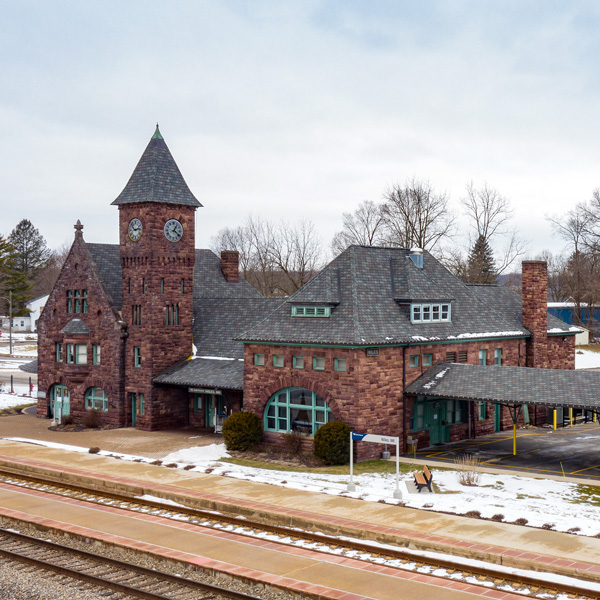Niles, MI (NLS)
Noted for its soaring tower and beautifully landscaped grounds, cared for by a local garden club, the historic depot is the site of an annual "Hometown Christmas" celebration.

598 Dey Street
Niles, MI 49120-1745
Annual Station Ridership (FY 2024): 17,900
- Facility Ownership: Amtrak
- Parking Lot Ownership: Amtrak
- Platform Ownership: Amtrak
- Track Ownership: Amtrak
Marty Sandoval
Regional Contact
governmentaffairschi@amtrak.com
For information about Amtrak fares and schedules, please visit Amtrak.com or call 1-800-USA-RAIL (1-800-872-7245).
The Niles station was built for the Michigan Central Railroad in 1892, and was placed on the National Register of Historic Places in 1979 and on the Michigan State Register in 1992. The station was planned by architects Frederich Spier and William C. Rohns, and the extensive gardens surrounding the station were designed by John Gipner of Germany. Still in use as a passenger depot, the station has changed little from its original structure. The asymmetrically-planned coursed brownstone structure was built in the Richardsonian Romanesque style, topped by high hipped and gabled roofs.
The building is divided into three sections: a 125-foot single-story hip-roofed baggage collection area connected to the main building by a 50-foot-long hip-roofed covered walkway; the lobby, dining, and smoking rooms; and the circular waiting room. The main front gabled section features an arched entrance and second-story bay window, with an apsidal extension surrounded by a veranda. Dominating the station-side façade is a 60-foot high tower housing the station’s clock, which was manufactured by Howard Brothers of Boston.
The original interior featured a waiting room with a fireplace in the rounded west end, a smoking room in the center of the building and a dining room in the east end; a 44-foot by 25-foot wing street-side of the dining room contained the kitchen on the first floor and an apartment for the restaurant manager on the second floor. The most major changes have been the conversion of the kitchen and dining room into the engineering offices and signals rooms. The Amtrak ticket office takes up the former Smoking Room, and the room that was the ticket office is the men’s restroom now.
In 1935 the New York Central bought the Michigan Central, and the greenhouses were torn down—the station’s gardens had supplied fresh flowers both for its dining room and the trains. While the original gardens have not been replaced, the landscaping is still well maintained, thanks in large part to the Four Flags Garden Club. Amtrak has owned the station and the former Michigan Central route since 1976. The station itself was renovated in 1988 and last received an exterior rehabilitation around 2003.
As it retains much of its grand 19th century character, the Niles station has been used for location shots in three movies: Continental Divide, Midnight Run and Only the Lonely. In the last movie, in 1990, the depot was decorated with Christmas lights for a scene. With the filming done, the movie company offered to donate the lights to Amtrak, which owns the building. Amtrak declined the offer, so the lights were given to the Four Flags Garden Club. Since that year, the station has been decorated and lit on the first of December through Christmas, with permanent wiring installed just for that purpose. The garden club hosts a ceremony in the depot each year for the lighting of the depot.
The story of Niles began with Fort St. Joseph, built by the French in 1691 on the east side of the St. Joseph River where it intersected the Sauk Trail, a road much used by the Native Americans of the time. The fort was under French control for almost 100 years, until the fall of New France in 1761, when the British 60th Regiment conquered the trading outpost and occupied it—until 1781, when a Spanish excursion from St. Louis overtook the fort without firing a shot. However, in 1783, the United States took possession as part of the Treaty of Paris, along with the rest of Michigan. When the Four Flags hotel opened in 1925 in Niles, the term “Four Flags Region” gained currency.
Niles, as such, was not settled until 1823 by Virginian Isaac Thompson. It was officially founded in 1839 and named after then-famous Baltimore journalist Hezekiah Niles. The town was incorporated as the first city in Berrigen County in 1859. The Michigan Central came through Niles in 1848-1849. The Michigan Air-Line and Big Four had also laid routes through the city by 1871 and 1882 respectively. The current passenger routes move on the former Michigan Central rails now owned by Amtrak, the other routes having been abandoned over the years.
John and Horace Dodge, automobile industry pioneers and founders of the Dodge Brothers automobile manufacturers (1900) came from Niles, Michigan. However, automotive manufacturing did not come to Niles, which instead supports the still-water-powered French Paper and Pulp Company, among other industrial concerns. Niles’ Downtown Development Authority, formed in 1978, has in the last decade garnered many awards for both its economic development and historic preservation and restoration of downtown structures. Niles Main Street actively works to attract residents and business back to their downtown. The city actively promotes several festivals throughout the year in the downtown and Riverfront Park—Niles River fest, Bluegrass Festival, Hunter Ice Festival and Apple Festival Parade. This and the University of Notre Dame, a short drive across the state line in Indiana, provide an economic engine in the station area.
The Blue Water and Wolverine Service are financed primarily through funds made available by the Michigan Department of Transportation.
Station Building (with waiting room)
Features
- ATM not available
- No elevator
- No payphones
- No Quik-Trak kiosks
- Restrooms
- Unaccompanied child travel not allowed
- No vending machines
- No WiFi
- Arrive at least 0 minutes prior to departure
Baggage
- Amtrak Express shipping not available
- No checked baggage service
- No checked baggage storage
- Bike boxes not available
- No baggage carts
- Ski bags not available
- No bag storage
- Shipping boxes not available
- Baggage assistance provided by Train staff assistance only
Parking
- Same-day parking is available; fees may apply
- Overnight parking is available; fees may apply
Accessibility
- No payphones
- Accessible platform
- Accessible restrooms
- No accessible ticket office
- Accessible waiting room
- Accessible water fountain
- Same-day, accessible parking is available; fees may apply
- Overnight, accessible parking is available; fees may apply
- No high platform
- Wheelchair available
- Wheelchair lift available
Hours
Station Waiting Room Hours
| Mon | 08:00 am - 10:00 pm |
| Tue | 08:00 am - 10:00 pm |
| Wed | 08:00 am - 10:00 pm |
| Thu | 08:00 am - 10:00 pm |
| Fri | 08:00 am - 10:00 pm |
| Sat | 08:00 am - 10:00 pm |
| Sun | 08:00 am - 10:00 pm |
Ticket Office Hours
| Mon | CLOSED |
| Tue | CLOSED |
| Wed | CLOSED |
| Thu | CLOSED |
| Fri | CLOSED |
| Sat | CLOSED |
| Sun | CLOSED |
Passenger Assistance Hours
| Mon | CLOSED |
| Tue | CLOSED |
| Wed | CLOSED |
| Thu | CLOSED |
| Fri | CLOSED |
| Sat | CLOSED |
| Sun | CLOSED |


 Amtrak established the Great American Stations Project in 2006 to educate communities on the benefits of redeveloping train stations, offer tools to community leaders to preserve their stations, and provide the appropriate Amtrak resources.
Amtrak established the Great American Stations Project in 2006 to educate communities on the benefits of redeveloping train stations, offer tools to community leaders to preserve their stations, and provide the appropriate Amtrak resources. Amtrak is seizing a once-in-a-lifetime opportunity to transform rail and Retrain Travel. By modernizing, enhancing and expanding trains, stations and infrastructure, Amtrak is meeting the rising demand for train travel. Amtrak offers unforgettable experiences to more than 500 destinations across 46 states and parts of Canada. Learn more at
Amtrak is seizing a once-in-a-lifetime opportunity to transform rail and Retrain Travel. By modernizing, enhancing and expanding trains, stations and infrastructure, Amtrak is meeting the rising demand for train travel. Amtrak offers unforgettable experiences to more than 500 destinations across 46 states and parts of Canada. Learn more at